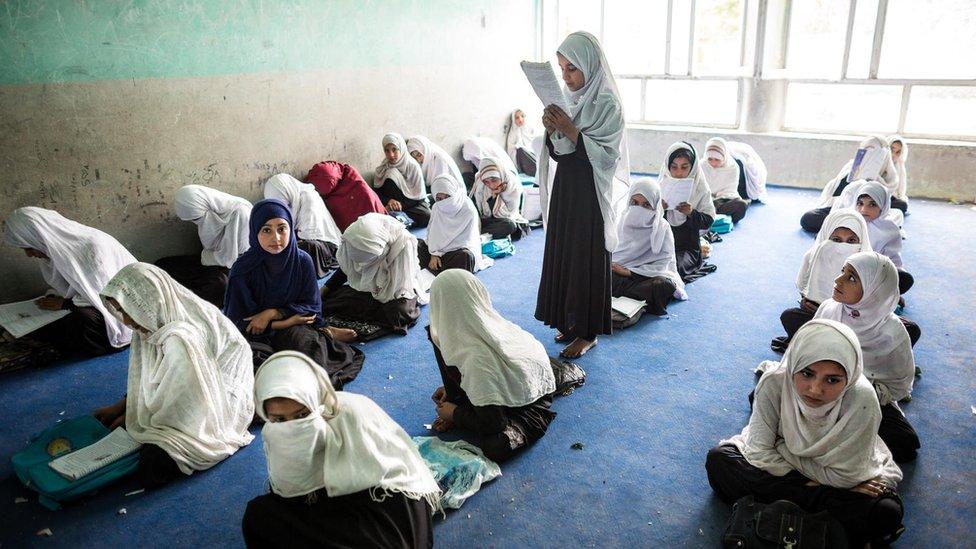Attacks on schools in Afghanistan have tripled in one year
- Published
- comments

10-year-old Wajiha reads out loud the new lesson taught in her Dari class
Attacks on schools in Afghanistan have tripled between 2017 and 2018 - the first time school attacks have gone up since 2015.
During this period, the number increased from 68 to 192, according to the United Nations Children's Fund (better known as Unicef).
The ongoing conflict and worsening security situation across the country left more than 1,000 schools closed by the end of last year.
Half a million children couldn't get access to education as a result.
Why is it difficult to go to school in Afghanistan?
This picture shows Unicef education officer Masood Nassir in Nangarhar teaching a class in Peer Sayed Ahmad Gilani school in eastern Afghanistan
Access to education and safe learning environments is one of the many challenges children face in Afghanistan.
An estimated 3.7 million children between the ages of seven and 17 - nearly half of all school-aged children in the country - don't go to school in Afghanistan.
The rate of out-of-school children increased last year for the first time since 2002.
This is due to fighting in the country, which is threatening people's safety as they go about their normal lives - for example, attending school. High rates of poverty and discrimination against girls also makes the problem worse.
Girls account for six in every ten of the children not in education.
Education is under fire in Afghanistan
Why are schools being attacked in Afghanistan?
Students in Nangarhar Province in Afghanistan
The Afghan government is in conflict with a group called the Taliban, who are fighting for the leaders of their group to be in charge of the country again.
The Taliban is an extreme Islamic group, which ruled Afghanistan from 1996 to 2001.
One reason for the recent increase in school attacks is because of the use of schools as polling centres for the parliamentary elections in 2018.
In September 2018, the Taliban warned students and teachers not to allow their schools to be used for voting. The group intimidated teachers and educational officials.
The senseless attacks on schools ... and the threats against education are destroying the hopes and dreams of an entire generation of children.
Peer Sayed Ahmad Gilani school in eastern Afghanistan was used as a polling centre, which made it a target.
None of the 3,000+ students at the school were physically hurt, but many of them were traumatised and didn't attend classes for a couple of months afterwards.
In the Farah province in western Afghanistan, the Taliban told officials to remove all male teachers from girls' schools.
During the time the Taliban were in power, girls' education was forbidden and women had to remain in their homes.
The recent attacks on schools have led some people to fear a return to the strict days of Taliban rule.
What is life like for children in Afghanistan?
Ka'enat - in the picture below - is 12 years old.
She and her family escaped the fighting in Shinwar district of Nangarhar province in Afghanistan. They now live in the Surkhrod district of Nangarhar.
Ka'enat, a 12-year-old girl, escaped the fighting in the Shinwar district of Nangarhar province in Afghanistan
Ka'enat feels happy to be sitting in a classroom, as she couldn't do this back in her village.
Education for girls in many areas in Afghanistan like Shinwar - where Ka'enat came from - is banned or threatened.
The ongoing violence, including bombings and explosions, prevents many parents sending their daughters to school.
Although many students live with insecurity and take great risks by coming to class each day, Ka'enat remains committed to pursuing her education.
"I like Pashto language as a subject and I like learning new languages to be able to communicate with everyone," she says.
What's the situation now?
At the moment, the Taliban, the Afghan government and the US are trying to organise a peace deal to end the 17-year conflict in Afghanistan.
But for now, the fighting continues.
- Published29 May 2019
- Published25 January 2019
